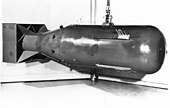
| Nuclear weapons |
|---|
 |
| Background |
| Nuclear-armed states |
|
Eight sovereign states have publicly announced successful detonation of nuclear weapons.[1] Five are considered to be nuclear-weapon states (NWS) under the terms of the Treaty on the Non-Proliferation of Nuclear Weapons (NPT). In order of acquisition of nuclear weapons, these are the United States, Russia (the successor of the former Soviet Union), the United Kingdom, France, and China. Of these, the three NATO members, the United Kingdom, the United States, and France, are sometimes termed the P3.[2]
Other states that possess nuclear weapons are India, Pakistan, and North Korea. Since the NPT entered into force in 1970, these three states were not parties to the Treaty and have conducted overt nuclear tests. North Korea had been a party to the NPT but withdrew in 2003.
Israel is also generally understood to have nuclear weapons,[3][4][5][6][7] but does not acknowledge it, maintaining a policy of deliberate ambiguity.[8] Israel is estimated to possess somewhere between 75 and 400 nuclear warheads.[9][10] One possible motivation for nuclear ambiguity is deterrence with minimum political friction.[11][12]
States that formerly possessed nuclear weapons are South Africa (developed nuclear weapons but then disassembled its arsenal before joining the NPT)[13] and the former Soviet republics of Belarus, Kazakhstan, and Ukraine, whose weapons were transferred to Russia.
According to the Federation of American Scientists there are approximately 3,880 active nuclear warheads and 12,119 total nuclear warheads in the world as of 2024.[14] The Stockholm International Peace Research Institute (SIPRI) estimated in 2023 that the total number of nuclear warheads acquired by nuclear states reached 12,512. Approximately 9,576 are kept with military stockpiles. About 3,844 warheads are deployed with missiles. 2,000 warheads, which are primarily from Russia and the United States, are maintained for high operational alerts.[15]
- ^ "World Nuclear Forces, SIPRI yearbook 2020". Stockholm International Peace Research Institute. January 2020. Retrieved 18 June 2020.
- ^ Murdock, Clark A.; Miller, Franklin; Mackby, Jenifer (13 May 2010). "Trilateral Nuclear Dialogues Role of P3 Nuclear Weapons Consensus Statement". Center for Strategic and International Studies. Retrieved 13 May 2010.
- ^ Hersh, Seymour (27 October 1991). "Authors Note". The Samson Option. Random House. ISBN 978-0394570068."This is a book about how Israel became a nuclear power in secret." (First sentence, Authors' Note/Introduction, The Samson Option: Israel's Nuclear Arsenal and American Foreign Policy, Hersh)
- ^ "Nuclear Weapons: Who Has What at a Glance". Arms Control Association. July 2019. Retrieved 5 August 2020.
India, Israel, and Pakistan never signed the NPT and possess nuclear arsenals.
- ^ Rosen, Armin (10 November 2014). "Israel's Nuclear Arsenal Might Be Smaller And More Strategic Than Everyone Thinks". Business Insider. Archived from the original on 6 December 2016. Retrieved 16 January 2017.
The country possesses some of the most powerful weaponry on earth, along with delivery systems that give it the ability to strike far beyond its borders.
- ^ "Israel". Nuclear Threat Initiative. May 2015. Archived from the original on 16 January 2017. Retrieved 16 January 2017.
While experts generally agree that Israel possesses nuclear weapons, no such current open source consensus exists on the status of Israel's offensive chemical or biological weapons programs.
- ^ Stover, Dawn (16 September 2016). "Does Israel really have 200 nuclear weapons, or was Colin Powell exaggerating?". Bulletin of the Atomic Scientists. Archived from the original on 18 January 2017. Retrieved 16 January 2017.
The boys in Tehran know Israel has 200, all targeted on Tehran, and we have thousands.
citing primary source private email from Colin Powell to Jeffrey Leeds [1] Archived 16 February 2017 at the Wayback Machine - ^ Harding, Luke (12 December 2006). "Calls for Olmert to resign after nuclear gaffe Israel and the Middle East". The Guardian. London. Retrieved 15 May 2009.
- ^ Nuclear Forces Archived 7 January 2015 at the Wayback Machine, Stockholm International Peace Research Institute, sipri.org
- ^ There are a wide range of estimates as to the size of the Israeli nuclear arsenal. For a compiled list of estimates, see Avner Cohen, The Worst-Kept Secret: Israel's bargain with the Bomb (Columbia University Press, 2010), Table 1, page xxvii and page 82.
- ^ Cite error: The named reference
NTIIsraelwas invoked but never defined (see the help page). - ^ Avner Cohen (2010). The Worst-Kept Secret: Israel's bargain with the Bomb. Columbia University Press.
- ^ Arms Control and Global Security, Paul R. Viotti – 2010, p 312
- ^ "Status of World Nuclear Forces". Federation of American Scientists. Retrieved 5 April 2024.
- ^ Kristensen, Hans M; Korda, Matt. (2023). "World Nuclear Forces 2023". In SIPRI Yearbook 2023: Armaments, Disarmament and International Security.Oxford University Press.